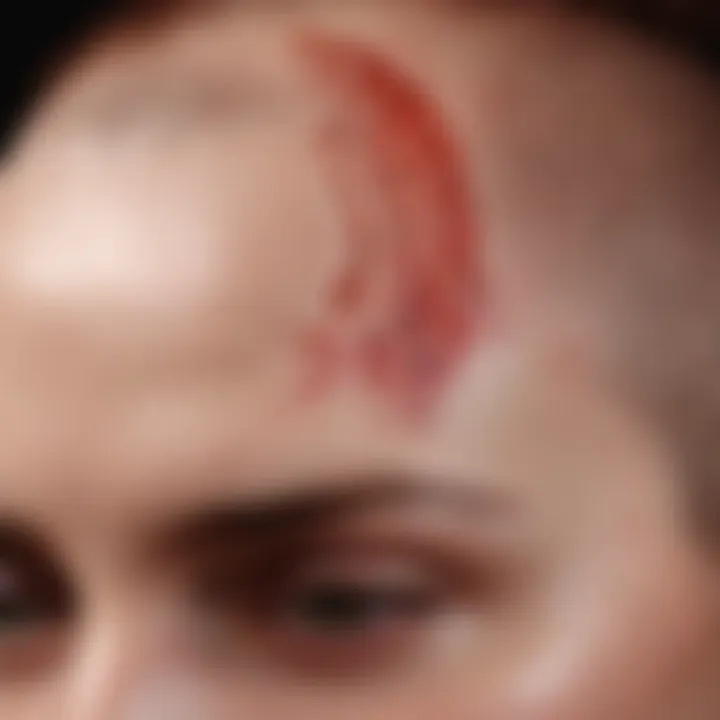Effective Strategies for Managing Psoriasis on the Scalp: A Comprehensive Guide


Beauty Tips and Tricks
Psoriasis affecting the scalp can be a challenging condition to manage, requiring a targeted approach to skincare and lifestyle adjustments. To effectively address scalp psoriasis, it is crucial to adopt a comprehensive skincare routine tailored to this specific concern. Incorporating gentle cleansing agents and nourishing moisturizers can help soothe irritated skin and alleviate flaking. Additionally, considering haircare hacks such as using gentle shampoos and avoiding harsh styling products can contribute to scalp health.
Product Reviews
When dealing with scalp psoriasis, selecting the right skincare products is essential. Opting for moisturizers with soothing ingredients like aloe vera or colloidal oatmeal can provide much-needed relief. It's also advisable to choose shampoos formulated for sensitive scalps, free from harsh chemicals that can exacerbate psoriasis symptoms. Exploring haircare product reviews that focus on scalp health and gentle ingredients can guide individuals in making informed choices for managing psoriasis.
Expert Beauty Advice
Seeking advice from skincare specialists and dermatologists can offer valuable insights into managing scalp psoriasis effectively. Professionals equipped with in-depth knowledge of skin conditions can recommend specific treatments and skincare routines tailored to individual needs. Additionally, consulting with hair stylists for tips on styling techniques that minimize scalp irritation can be beneficial. By combining expert recommendations with personal skincare practices, individuals can develop a holistic approach to scalp psoriasis management.
Understanding Psoriasis on the Scalp
Understanding Psoriasis on the Scalp is a crucial aspect of this comprehensive article on managing psoriasis in this specific area. Psoriasis, characterized by the rapid growth of skin cells leading to red, scaly patches, can be particularly troublesome when affecting the scalp due to its visibility and potential discomfort. By delving into the nature of Psoriasis on the Scalp, readers gain insight into the underlying mechanisms of this chronic skin condition, enabling them to make more informed decisions regarding their skincare routine, lifestyle adjustments, and treatment options. Understanding the distinct challenges posed by scalp psoriasis is essential for devising effective management strategies tailored to this specific area, enhancing the reader's ability to address symptoms and improve scalp health.
What is Scalp Psoriasis?
Scalp Psoriasis is a form of psoriasis that specifically affects the scalp, characterized by red, itchy plaques covered with silvery scales. This condition can extend beyond the hairline, onto the forehead, neck, and ears, causing discomfort and self-consciousness. Scalp Psoriasis can vary in severity, from mild scales to thick, crusted plaques, impacting hair growth and overall scalp health. It is crucial to differentiate Scalp Psoriasis from other scalp conditions to receive appropriate treatment and management strategies. Understanding the symptoms, triggers, and available treatment options for Scalp Psoriasis is vital for effectively controlling this condition and minimizing its impact on daily life.
Causes of Psoriasis on the Scalp
The causes of Psoriasis on the Scalp are multifactorial, stemming from genetic predisposition, immune system dysfunction, and environmental triggers. Individuals with a family history of psoriasis are more susceptible to developing Scalp Psoriasis, indicating a genetic component in the pathogenesis of this condition. Immune system malfunction plays a significant role in triggering the rapid turnover of skin cells characteristic of psoriasis, leading to the formation of plaques on the scalp. Environmental factors such as stress, infections, and certain medications can exacerbate Scalp Psoriasis, highlighting the complex interplay between genetic, immune, and external influences in the development of this condition.


Symptoms of Scalp Psoriasis
Symptoms of Scalp Psoriasis manifest uniquely on the scalp, presenting as red patches covered with silvery scales, itching, and soreness. The shedding of scales from the scalp can result in flaking, resembling dandruff but with larger, more silvery scales. In severe cases, individuals may experience hair loss or temporary thinning due to the inflammatory nature of Psoriasis on the Scalp. Recognizing the symptoms of Scalp Psoriasis is crucial for early intervention and effective management. Itching and discomfort can significantly impact daily activities and quality of life, underscoring the importance of promptly addressing symptoms to alleviate discomfort and restore scalp health.
Effective Skincare Practices
In this article focused on managing psoriasis specifically on the scalp, effective skincare practices play a fundamental role in alleviating symptoms and promoting scalp health. Psoriasis, characterized by rapid skin cell growth and red, scaly patches, necessitates a tailored approach to skincare to mitigate its effects efficiently. The significance of effective skincare practices lies in their ability to soothe irritated skin, reduce inflammation, and enhance the overall condition of the scalp. By employing proper skincare routines, individuals with scalp psoriasis can experience relief from itching, scaling, and discomfort. Understanding the specific needs of psoriatic skin is crucial in developing a skincare regimen that caters to its unique requirements.
Gentle Cleansing Techniques
When addressing scalp psoriasis, gentle cleansing techniques are paramount in maintaining scalp hygiene without exacerbating existing symptoms. Harsh shampoos and vigorous scrubbing can worsen inflammation and increase flaking, leading to further discomfort. Opting for mild, fragrance-free cleansers and gentle massaging motions during washing can effectively cleanse the scalp without stripping it of essential oils or triggering irritation. It is advisable to wash the scalp with lukewarm water and avoid hot water, as heat can aggravate psoriasis symptoms. Understanding the delicate balance between cleansing effectiveness and scalp sensitivity is key to implementing gentle cleansing techniques that support skin health.
Choosing the Right Shampoo
Selecting the right shampoo is a crucial aspect of managing psoriasis on the scalp effectively. Individuals with scalp psoriasis should opt for gentle, hypoallergenic shampoos specifically formulated for sensitive skin. Look for shampoos that contain moisturizing ingredients like aloe vera, coconut oil, or salicylic acid to soothe and nourish the scalp. Avoiding shampoos with harsh chemicals, artificial fragrances, and sulfates is essential to prevent further irritation and dryness. It is recommended to shampoo the hair regularly to remove scales and dead skin buildup, promoting a healthier scalp environment. By choosing the appropriate shampoo for scalp psoriasis, individuals can support the skin's natural balance and minimize discomfort.
Moisturizing the Scalp
Proper scalp moisturization is a vital component of managing psoriasis and promoting skin barrier function. Moisturizing the scalp helps alleviate dryness, reduce itching, and prevent flaking, enhancing overall scalp health. Opt for moisturizers specifically designed for the scalp, such as non-greasy, fragrance-free formulations that hydrate without clogging pores. Applying moisturizer to the scalp after showering or as needed throughout the day can provide relief from tightness and discomfort associated with psoriasis. Understanding the importance of consistent hydration for psoriatic skin empowers individuals to effectively manage symptoms and maintain scalp integrity. By incorporating scalp moisturization into a routine skincare regimen, individuals with psoriasis can nurture healthier, more resilient skin.
Lifestyle Adjustments for Scalp Psoriasis
In the realm of effectively managing psoriasis specifically on the scalp, lifestyle adjustments play a pivotal role. The impact of lifestyle choices on scalp psoriasis cannot be overstated, as certain habits and behaviors can either exacerbate or alleviate symptoms. Lifestyle adjustments encompass a wide array of practices that can significantly influence the severity and frequency of psoriasis flare-ups on the scalp.
When delving into the nuances of lifestyle adjustments for scalp psoriasis, it becomes evident that stress management techniques stand out as a crucial aspect. Stress has long been recognized as a trigger for various skin conditions, including psoriasis. Implementing effective stress management techniques can help reduce the likelihood of flare-ups and alleviate existing symptoms. Techniques such as mindfulness, deep breathing exercises, and yoga can aid in stress reduction and promote overall well-being, thereby contributing to scalp health.


Another vital component of lifestyle adjustments for scalp psoriasis revolves around dietary considerations. The link between diet and psoriasis has garnered attention in recent years, with certain foods being associated with inflammation and potential exacerbation of symptoms. Incorporating anti-inflammatory foods rich in omega-3 fatty acids, antioxidants, and vitamin D can help mitigate inflammation and support skin health. Moreover, avoiding trigger foods that may prompt immune responses can play a significant role in managing scalp psoriasis effectively.
Furthermore, avoiding triggers is paramount in the journey of addressing scalp psoriasis through lifestyle adjustments. Identifying and steering clear of triggers that aggravate psoriasis symptoms is crucial for symptom management. Triggers can vary from person to person and may include stress, certain foods, environmental factors, or even specific skincare products. By maintaining awareness of individual triggers and actively avoiding them, individuals can optimize their efforts in controlling scalp psoriasis and promoting a healthier scalp environment.
Medical Treatments for Scalp Psoriasis
Psoriasis on the scalp can be particularly challenging to manage, given the sensitive nature of the skin in that area. In this article, we delve into the significance of medical treatments for scalp psoriasis. By understanding the specific elements, benefits, and considerations of medical treatments, individuals can make informed decisions to effectively alleviate symptoms and improve scalp health.
Topical Treatments
Topical treatments play a vital role in the management of scalp psoriasis. These treatments come in various forms such as creams, ointments, gels, and shampoos. They are applied directly to the scalp to help reduce inflammation, soothe irritation, and break down scales. Some topical treatments contain corticosteroids, which are effective in controlling flare-ups and promoting healing. Other options include coal tar preparations, which slow down skin cell growth and alleviate itching. It is essential to follow the prescribed usage instructions and consult a dermatologist for the most suitable topical treatment based on individual needs.
Phototherapy
Phototherapy, also known as light therapy, is another beneficial treatment option for scalp psoriasis. This treatment involves exposing the scalp to controlled amounts of natural or artificial ultraviolet (UV) light. UV therapy helps to slow down the rapid growth of skin cells, reduce inflammation, and alleviate itching. Phototherapy can be performed in a dermatologist's office using specialized equipment or even natural sunlight in some cases. Regular sessions are often required to achieve optimal results, and protective measures must be taken to prevent sunburn and other UV-related risks.
Oral Medications
In more severe cases of scalp psoriasis, oral medications may be prescribed to manage symptoms and improve the condition of the scalp. Oral medications for psoriasis typically include retinoids, methotrexate, cyclosporine, or biologics. These medications work internally to suppress the overactive immune response that contributes to psoriasis symptoms. However, oral medications can have side effects and interactions with other medications, requiring close monitoring by a healthcare provider. It is crucial to follow the prescribed dosage and attend regular follow-up appointments to assess the medication's effectiveness and address any concerns.
Biologic Injections
Biologic injections are a specialized form of treatment for severe scalp psoriasis that does not respond to other therapies. Biologics are genetically engineered proteins that target specific parts of the immune system involved in the development of psoriasis. By blocking these immune responses, biologics help reduce inflammation, slow down skin cell growth, and alleviate symptoms. Biologic injections are typically administered by a healthcare professional and require regular monitoring for efficacy and safety. The decision to undergo biologic therapy should be made in consultation with a dermatologist to determine the most suitable treatment plan based on individual needs and medical history.


Home Remedies and Alternative Therapies
In the realm of managing psoriasis on the scalp, the incorporation of home remedies and alternative therapies plays a pivotal role in enhancing treatment outcomes. These methods, which have been passed down through generations and often involve natural ingredients, offer individuals the opportunity to complement medical treatments and promote scalp health holistically. When exploring home remedies and alternative therapies, it is essential to consider their potential benefits, such as their gentle nature on the skin and scalp, minimal side effects compared to some conventional treatments, and cost-effectiveness. Although these approaches may not serve as standalone solutions for severe cases, they can serve as valuable supplementary strategies in a comprehensive treatment plan for scalp psoriasis.
Natural Oils and Herbs
Natural oils and herbs have long been celebrated for their therapeutic properties in skincare and are increasingly recognized for their potential benefits in managing psoriasis on the scalp. Essential oils like tea tree oil, lavender oil, and coconut oil possess anti-inflammatory and moisturizing properties that can help soothe scalp irritation and reduce flakiness. Similarly, herbal remedies such as aloe vera, neem, and calendula are known for their healing and anti-fungal properties, which can aid in alleviating symptoms of scalp psoriasis. When integrating natural oils and herbs into scalp care routines, individuals should perform patch tests to ensure skin compatibility and consider consulting with a dermatologist to determine the most suitable options for their specific condition.
Scalp Massage Techniques
Scalp massage techniques offer a therapeutic and relaxing approach to managing scalp psoriasis symptoms, promoting blood circulation and reducing stress levels. By gently massaging the scalp with fingertips or utilizing specialized tools like scalp massagers, individuals can help alleviate itching, enhance the absorption of topical treatments, and foster a sense of well-being. Incorporating essential oils like lavender or rosemary oil during scalp massages can further enhance the therapeutic benefits by combining the soothing effects of massage with the properties of the oils. While scalp massage techniques are not a cure for psoriasis, they can serve as a valuable self-care practice to complement medical treatments and improve overall scalp health.
Acupuncture and Acupressure
Acupuncture and acupressure, traditional Chinese medicine practices rooted in stimulating specific points on the body to promote healing, have shown promise in alleviating symptoms of various skin conditions, including psoriasis. By targeting meridian points related to immune function and skin health, acupuncture and acupressure sessions can help regulate inflammatory responses, reduce itchiness, and enhance relaxation. While more research is needed to establish the definitive effectiveness of these practices for scalp psoriasis specifically, some individuals have reported improvements in their symptoms and quality of life following acupuncture or acupressure treatments. Prior to engaging in acupuncture or acupressure, individuals should consult with a licensed practitioner experienced in treating skin conditions to ensure safe and effective therapy outcomes.
Consulting a Dermatologist
Managing psoriasis on the scalp can be a complex and challenging task that often requires expert guidance from a dermatologist. Consulting a dermatologist is a crucial step in developing a tailored treatment plan that addresses the unique needs of individuals dealing with scalp psoriasis. Dermatologists are highly trained medical professionals specializing in skin conditions, including psoriasis. Their expertise allows them to accurately diagnose the severity of scalp psoriasis and recommend the most effective treatment strategies.
A dermatologist plays a key role in not only managing the physical symptoms of scalp psoriasis but also addressing the emotional impact it can have on individuals. By seeking professional guidance, patients can gain a better understanding of their condition and receive personalized care that aligns with their specific requirements. Dermatologists can provide valuable insights into triggers that exacerbate psoriasis flare-ups and offer tailored advice on lifestyle adjustments.
Importance of Professional Guidance
Receiving professional guidance from a dermatologist is essential for individuals grappling with scalp psoriasis. Dermatologists possess in-depth knowledge of the latest advancements in psoriasis treatment, ensuring that patients receive cutting-edge care. Additionally, they can monitor the progression of the condition over time, making adjustments to the treatment plan as needed. Professional guidance instills confidence in individuals, knowing that they are under the care of a skilled specialist who prioritizes their well-being.
Treatment Options and Recommendations
When consulting a dermatologist for scalp psoriasis, individuals can expect a range of treatment options and recommendations tailored to their unique needs. These may include topical treatments such as medicated shampoos, corticosteroids, or calcineurin inhibitors to alleviate symptoms and reduce inflammation. In more severe cases, dermatologists may recommend phototherapy, oral medications, or biologic injections to effectively manage scalp psoriasis.
Alongside conventional treatments, dermatologists may also suggest alternative therapies or home remedies that complement medical interventions. These could involve the use of natural oils, scalp massage techniques, or acupuncture to enhance the efficacy of the treatment plan. By collaborating with a dermatologist, individuals can explore various treatment avenues and make informed decisions to improve their scalp health and overall quality of life.







